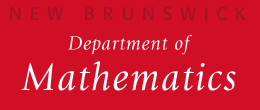Links
Proposals
Format
Menteeís Name
Mentorís Name
Topic
One paragraph giving a rough plan for the semester. This should include book(s) used, topics covered, etc. We realize that topic, pace, and book adjustments are normal and appropriate. It is thus completely expected and acknowledged that this is not any binding document, but a means to encourage mentees and mentors to make decisions about what they will work on and to help us keep tabs on the program.
Sample proposals
This semester we will be studying from a book entitled "Counting: The Art of Enumerative Combinatorics". We will cover counting techniques, inclusion-exclusion, generating functions, and recurrence relations. We may pursue other topics in combinatorics as interest arises.
We will be studying the gamma function and its properties. We will be using Emil Artinís book "The Gamma Function" as a reference. We will first study the basic analysis required to understand the gamma function. Then, we will study the gamma function itself and the theory behind it. Finally, we will explore its many properties.
The goal of this Directed Reading project is an introduction to the standard model of particle physics through groups and gauge theory. Important topics will include Lie algebras, unitary groups, and particle representations, and among the references will be Fulton and Harris's "Representation Theory", Georgi's "Lie Algebras for Physicists", Hermann's "Lie Groups for Physicists" and lectures on the standard model, quantum field theory, and gague theory from various sources. If time permits, we will go beyond the standard model and look at algebraic geometry in string theory or supersymmetric particle theory.
Jordan and I will read the first few chapters of Munkres' "Topology". This will include an introduction to such notions as what a topology is, compactness, connectedness, and so on.
We propose to study basic number theory, as well as some basic concepts in abstract algebra which apply to number theory. We'll start on parallel tracks by learning number theoretic concepts such as Euclid's algorithm, modular forms, and the Chinese remainder theorem (for integers), while also looking at the concepts of groups, subgroups, cosets, Lagrange's theorem, and quotient groups. We'll then see how these powerful tools combine and prove Fermat's little theorem, and finally we'll study RSA encryption, which will make use of nearly all of these concepts. Time permitting, we may study more into specific parts of group theory and modular forms (with their applications).
Presentation abstracts
Format
Menteeís Name
Mentorís Name
Topic
Title
One paragraph explaining what material will be covered during your presentation. This is not the same thing as the proposal. You are not expected to talk about everything that youíve learned and the abstract should give your peers an idea about what your talk will be on.
Sample abstracts
The Nature and Purpose of an Adequate Modal Propositional Logic
In this talk, I will attempt to briefly answer the following questions: What is the nature of logic? What do we want a logical system to do? What are some logical systems that do some of the things we want done? What does a modal logic do that other logical systems do not do?
An Introduction to Set Theory
The presentation will contain topics relating to set theory. Topics will include the way in which set theory is the foundation of mathematics and an introduction to first-order logic. The concepts of sets and proofs will also be discussed, as well as a description of Russellís paradox and the necessity of axiomatic set theory. The presentation will also provide an enumeration of the axioms of set theory, brief descriptions of each, and how each axiom is useful.
About the presentation
Every participant must give a short presentation at the end of the semester. Its main purpose is to serve as a friendly opportunity to practice giving a math talk. A secondary purpose naturally is to allow participants to share what they have learned.
Each presenter will have 15-20 minutes. Speakers may give an overview of their project and/or discuss one of the covered topics in more detail. For example, a crucial theorem or lemma may be stated and a sketch of its proof may be given. Or perhaps an example or construction that is of special importance can be introduced and explained. Or maybe the solution to an interesting and illustrative problem or textbook exercise can be offered.
The talk should be easy to follow by the audience which will be primarily comprised of other DRP participants -- undergraduates of very different backgrounds who may not be math majors and who may have taken only a few upper-level math courses. Presenters must define all terms and state all results that may not be familiar to everyone in the audience. The speakers should aim to give a talk that is understandable and enjoyable!
In preparing for the talk, it may be helpful to give a practice talk. Participants are encouraged to ask a friend or their mentors for help with this. Speakers must make sure everything they wish to say can be said comfortably in fifteen minutes: there will invariably be interruptions and presenters will easily spend five minutes answering unanticipated questions from the audience. Fifteen minutes is a very short time for a math talk so the contents of the talk must be chosen very carefully.
Aside from adhering to these guidelines, speakers should give themselves license to draw from all their talents and their creativity to deliver a great talk!








